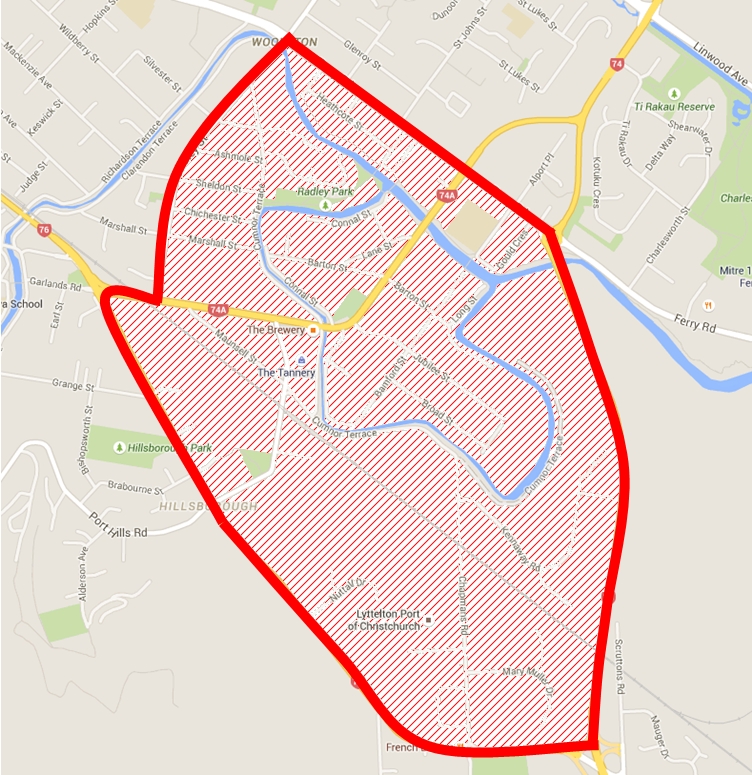Friday 12 June 2015Media release4 minutes to read
THIS IS AN ARCHIVED PAGE. The advice and information contained in this page may not be current and it should only be used for historical reference purposes.
Canterbury District Health Board and Christchurch City Council officials are working with representatives from the air conditioning industry to contact businesses in an industrial area in Hillsborough to ensure water-based cooling systems are being properly maintained.
This is in response to a small cluster of Legionnaires' disease cases in the area. Since the beginning of April, laboratory testing has confirmed that six adults have been hospitalised by the bacteria Legionella pneumophila serogroup 1. Possible sources for this type of Legionnaires' disease include cooling towers and evaporative condensers.
Canterbury Medical Officer of Health Dr Ramon Pink is urging businesses in the area to sample and treat their cooling towers and evaporative condensers.
“The Legionella bacteria can live in water-based cooling systems, and can become dangerous when airborne. Businesses with these systems need to regularly sample and, where necessary, treat them to prevent the bacteria from circulating,” says Dr Pink.
On 8 April a contaminated cooling tower was identified and treated. It is possible that this cooling tower was the source of all four cases notified in April. Two more cases were identified during May, indicating there maybe another source.
Dr Pink says the risk to an individual living or working in the area of contracting Legionnaires' disease is very low.
Of the six cases, four were female and two male. They ranged in age from 49-79, and all have links to the area. All have been discharged from hospital.
Symptoms of Legionnaires' disease include influenza-like symptoms, a fever, muscle aches and a headache. If you are concerned, or displaying these symptoms, please contact your general practice team.
Home air conditioners and heat pumps, and vehicle air conditioners, are not a source of legionella bacteria.
Frequently Asked Questions
When did the CDHB first become aware of the cases?
Cases were notified to Community and Public Health on the following days:
1 April*
8 April
9 April
14 April
17 May*
25 May
* Both these cases live and work outside the area. Investigations have discovered links to the area.
What did the CDHB do when it became aware of the cases?
Community and Public Health contacted each case within 24 hours to investigate possible sources of the disease. These investigations revealed that all six cases have links to the industrial area. Three live in the area, 2 are regular visitors, and 1 works in the area.
What has been done to identify the source?
This form of bacteria is known to live in water-based cooling systems.
On 8 April a cooling tower linked to the second case was found to be contaminated with the Legionella bacteria. The cooling tower was immediately treated.
As it can take up to 10 days for symptoms of the disease to develop, it is possible that three other cases notified during April were also linked to this cooling tower.
In May two new notifications were received, indicating the possibility of another source. The case notified on 17 May lives outside the area, and the case notified on 25 May lives inside the area.
Officials are working with representatives from the Institute of Refrigeration, Heating and Air Conditioning Engineers Inc. (IRHACE) and the Climate Control Companies Association (CCCA) to identify businesses known to have cooling towers and evaporative condensers.
What area is being focused on?
Businesses in the industrial area within these streets:
Garlands Road and Opawa Road intersection, down Port Hills Road, to the Tunnel Road turn off
Tunnel Road to Ferry Road
Ferry Road to Radley Street
Radley Street to Garlands Road
Garlands Road to Opawa Road
Hillsborough

Are people living or working in the area at risk?
The risk to an individual living in the area of contracting Legionnaires' disease is considered very low. The last case was notified 19 days ago.
Adequately maintaining cooling towers and evaporative condensers is the only way to remove the risk completely.
What are the requirements on workplaces?
Workplaces have a general legal responsibility to provide and maintain a safe working environment for employees, ensure that plant is safe and that employees are not exposed to hazards. Preventing Legionella bacteria from circulating by regularly testing and cleaning cooling towers is important in ensuring a safe working environment.
What do businesses with cooling towers and evaporative condensers need to do to maintain them?
Up-to-date information, advice and guidance for minimising the risk of significant contamination in waters of cooling towers and cold and heated water distribution systems can be found on the Ministry of Health website: http://www.health.govt.nz/publication/prevention-legionellosis-new-zealand-guidelines-control-legionella-bacteria.
What about heat pumps?
Home air conditioners and heat pumps, and vehicle air conditioners, are NOT a source of Legionella bacteria.
What are the symptoms?
Symptoms of Legionnaires' Disease include:
Influenza-like symptoms
Fever
Muscle aches
Headache
If you are concerned or displaying these symptoms please contact your general practice team.
Tags Christchurch City CouncilDr Ramon PinkLegionnaires' disease
Back to Health News

